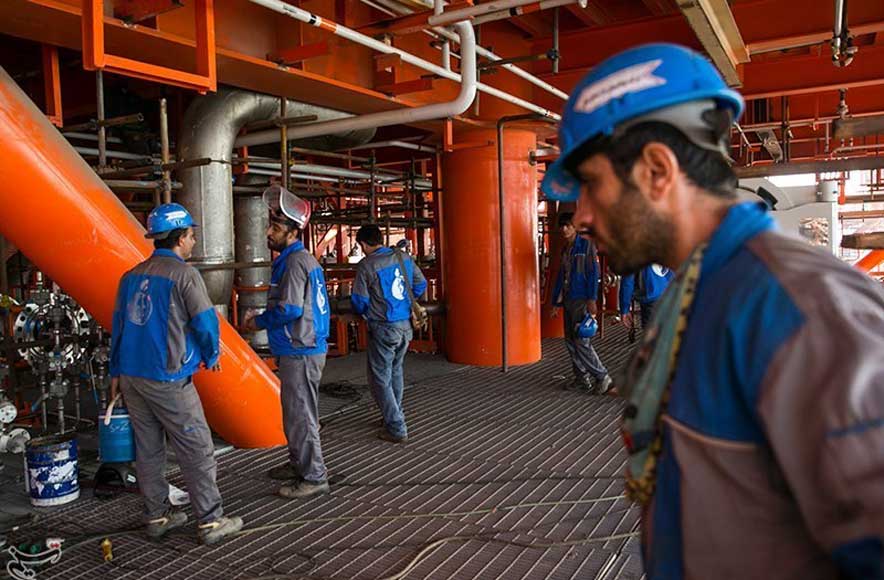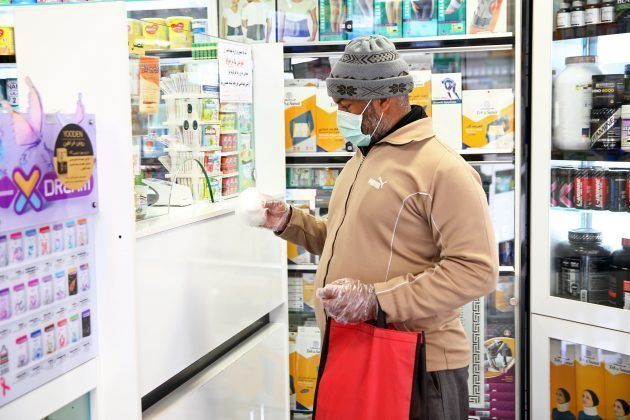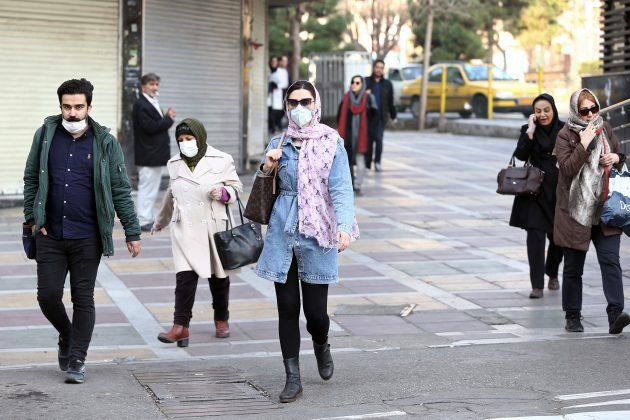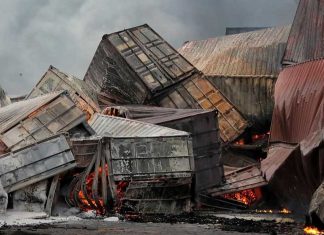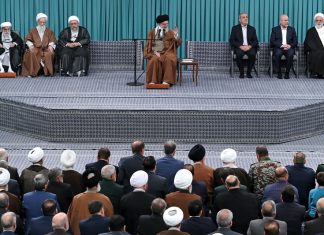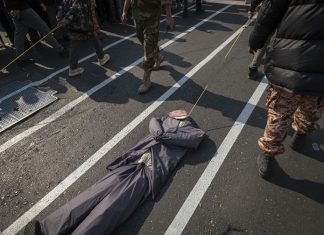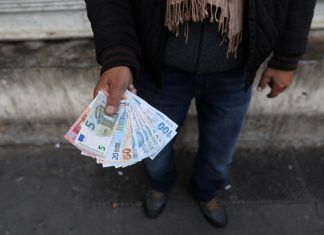The Iranian government has been slow in responding to the outbreak of the Novel Coronavirus COVID-19 that has infected 4747 people and claimed 124 lives in the country so far. Most of the victims are from Tehran and the holy city of Qom, where the first cases of the virus were discovered.
While many schools across the country remain open, most parents have kept their children at home as part of broader preventive “social distancing” measures recommended by global health organizations to minimize the risk of infection.
Meanwhile, the coronavirus is reportedly spreading among workers in factories, hotels, restaurants, government offices, and supermarkets at an alarming rate. Also, prison inmates and soldiers on military bases are among high-risk groups to contract the virus.
President Hassan Rouhani, who attended a meeting of the newly formed National Headquarters for Fighting Coronavirus on Feb. 25, said the situation in the country would return to normal by Feb. 29.
“From Saturday, all activities in the country must continue as in previous weeks,” Mr. Rohani said, “Our enemies are conspiring to bring the country to a halt by spreading fears.”It was not immediately clear what the president meant by returning to normal, given that the country is facing a severe health crisis with the rapid spread of the disease.
Article 85 of the Islamic Republic Labor Law states: “The guidelines on health, hygiene, and sickness in the workplace, drafted by the High Council of Technical Safety and the Ministry of Health and Medical Education, create a safe work environment and safeguards the country’s human resources, and, therefore, must be enforced in the workplace and observed by employers, workers, and trainees.”
Despite an urgent plea by doctors and health professionals, the government has failed to centralize its control over the epidemic and come up with a robust, comprehensive, and workable strategy for slowing down the spread of the virus.
As a task force, the National Headquarters for Fighting Coronavirus has so far not provided countrywide public health services, such as supplying hospitals with testing kits and closing all offices, businesses, factories, places of worship, schools, and public venues.
Thousands of day laborers, technicians, and engineers work on many industrial projects at the Pars Special Economic Energy Zone (PSEEZ) in Asaluyeh, in the southern province of Bushehr. While some employees at the PSEEZ live in the region, others are seasonal workers who stay in dormitories, hostels, and other temporary housing. Many of them worry about the outbreak of coronavirus. They fear that the lack of a coherent plan by the government and the management at the PSEEZ to fight the virus will increase their chances of getting infected.
Behrouz, a technician who works for Phase 13 of the South Pars Gas Field in Asaluyeh and manages a small team of workers, told Kayhan Life: “Some 1,000 people work in this phase of the operation, 90 percent of whom are seasonal workers and live in other cities.”
“Most manual laborers usually work 24 days straight and have six days off. Engineers and managers work 20 days straight and have 10 days off,” Behrouz explained. “There are dormitories on site which resemble industrial sheds. Each dormitory has 12 rooms. Between six and 10 workers live in each room. Depending on their position at the company, between one and four engineers and managers stay in one room.”
Speaking about the coronavirus infection in Asaluyeh, Behrouz said: “Everyone became concerned as soon as the news broke about the virus. Workers were asking us to shut down the operation. We discussed the situation with middle management, who told us that on the advice of head office in Tehran, they would maintain the same work schedule as before. The only change that they made was that we did not need to use the fingerprint scanner to enter and leave the site.”
[aesop_image img=”https://kayhanlife.com/wp-content/uploads/2019/01/2015-11-19T120000Z_548639761_GF20000066330_RTRMADP_3_IRAN-OIL.jpg” panorama=”off” credit=”FILE PHOTO: Iranian workers walk at a unit of South Pars Gas field in Asalouyeh Seaport, north of Persian Gulf, Iran . REUTERS” align=”center” lightbox=”off” captionsrc=”custom” captionposition=”left” revealfx=”off” overlay_revealfx=”off”]
“They threatened to dock our salaries and wages or even fine us if we stayed home,” Behrouz noted. “Most contract workers have signed a so-called ‘blank paper’ contract, which means that the company can penalize anyone who does not come to work and even withhold their wages. Workers must risk their health to feed their families.”
Asked about health and safety measures taken by the management to reduce the risk of infection, including providing the workers with masks, sanitizing hand gel, and mobile medical emergency units, Behrouz explained: “The management has not tried to protect the workforce. Every operational phase in Asaluyeh has a dedicated infirmary, which is run by a doctor (general practitioner) and a nurse. They provide basic medical care.”
“A worker came down with a cold and had a fever yesterday, so we took him to the infirmary, but the doctor said there was nothing wrong with him and sent the worker back to work. What if he was infected [with coronavirus]?” Behrouz noted. “He would have transmitted the virus to hundreds of other workers before heading home and spreading it to people on the bus and ultimately to his family and friends.”
“While we worry about such instances, management does not care,” Behrouz pointed out. “Workers leave the refinery and the petrochemical plants at dusk and head to the city to shop or relax. One can imagine the magnitude of the infection among the population if even one person were to carry the virus. Pharmacies in the city do not have any masks or sanitizing gel. They do not even sell disinfectant alcohol. They have not closed schools. We are all scared.”
“The workforce in Phase 13 is not that big, given that it was completed and streamlined while back,” Behrouz said. “Considerably more people work on the other operational phases in Asaluyeh, which are still under construction. For instance, 5,000 people work on Phase 14. There is a massive workforce in Asaluyeh. My colleagues who work on the other phases of the project tell me the situation is the same everywhere. The management has not provided masks and sanitizing gel to anyone. They have not even explained how we could protect ourselves against the virus.”
“Wearing a mask is mandatory in some parts of the Asaluyeh project such as the stonemasonry workshop,” Behrouz added. “The company’s warehouse has, however, run out of masks, and they cannot get anymore because there is a shortage of supply.”
The fear of a coronavirus epidemic has spread among the workforce across the country.
A worker at the Kaveh Industrial City, east of the city of Saveh in the central province of Markazi, who wished to remain anonymous, told Kayhan Life: “They have not approved my leave request, which I put in shortly after the coronavirus outbreak. Every few weeks, dozens of people from Saveh, Shahriar, Karaj, and Tehran arrive in Asaluyeh for work. They go back home after a while. Most workers travel on minivans and busses without wearing masks.”
“We asked the management to disinfect our workspace, but they have done nothing yet,” the worker explained. “I have a newborn baby, and I am terrified. I wanted to use my remaining 12 leave days, but they said I could not take any time off until March 19. They warned that unless we had a written letter from a hospital or needed surgery, otherwise, they would dock our wages or fine us if we did not show up at work.”
“It is unfair to treat us like this right before the new year [March 21],” the worker added. “I paid nearly $11 for an air filter mask, which is my government’s cash subsidy allowance for the entire month. I do not feel safe even with the mask. I am embarrassed to wear it at work because not everyone can afford to buy a mask. We consider it a luxury.”
[Translated from Persian by Fardine Hamidi]

